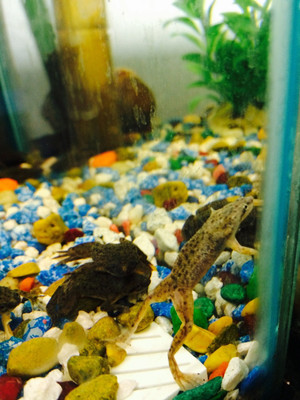The African Dwarf Frog: A Classic Aquatic Companion
Posted by Max Gandara on on 25th May 2023
The African Dwarf Frog: A Classic Aquatic Companion
The African Dwarf Frog (Hymenochirus sp.) is a captivating and popular
aquatic creature that has gained popularity among aquarists and
hobbyists worldwide. Known for its small size, unique behavior, and
low-maintenance requirements, this delightful frog species has become a
beloved addition to many home aquariums. In this article, we will delve
into the intriguing world of the African Dwarf Frog, exploring its
characteristics, habitat, care, and other interesting aspects.
1. Appearance and Physical Characteristics:
The African Dwarf Frog is a petite amphibian, with males growing to
approximately 1.5 inches (3.8 cm) in length, while females tend to be
slightly larger, reaching up to 2 inches (5 cm). They possess a
streamlined body shape, four webbed feet, and a slightly flattened head.
Their skin can display a range of colors, including shades of olive,
brown, or green, providing effective camouflage in their natural
habitat.
2. Natural Habitat:
Originating from the freshwaters of sub-Saharan Africa, these frogs are
found in slow-moving rivers, ponds, and marshes. They thrive in warm,
tropical climates and are often encountered in countries such as
Cameroon, Nigeria, and Guinea. African Dwarf Frogs are adept swimmers
and spend the majority of their time submerged, rarely venturing onto
land.
3. Behavior and Social Nature:
African Dwarf Frogs are known for their intriguing and entertaining
behavior. They are typically docile and non-aggressive, making them
suitable for community aquariums. These frogs are gregarious by nature
and prefer living in groups, so it is recommended to keep them in pairs
or small groups to ensure their mental well-being. Observing their
interactions, including their synchronized swimming and feeding
patterns, can be a delight for any observer.
4. Aquarium Requirements:
Creating a suitable environment is crucial for the health and well-being
of African Dwarf Frogs. Here are some key considerations for setting up
their aquarium:
a. Tank size: A minimum of a 10-gallon (38-liter) aquarium is
recommended for a pair of African Dwarf Frogs. The tank should have a
secure lid to prevent escapes, as these frogs are skilled jumpers.
b. Water conditions: Maintain a water temperature between 75-82°F
(24-28°C) using an aquarium heater. The pH should be slightly acidic,
ranging from 6.5 to 7.5. Regular water changes are essential to maintain
water quality.
c. Substrate and decoration: A soft substrate like sand or fine
gravel should be provided to prevent injury to the frogs. Adding live or
artificial plants, rocks, and driftwood can create hiding spots and
simulate their natural habitat.
d. Filtration and aeration: A gentle filter and an air pump with a
diffuser can help maintain water quality and ensure proper oxygenation.
5. Feeding and Nutrition:
African Dwarf Frogs are primarily carnivorous and have a hearty
appetite. Their diet consists of various live or frozen foods, including
bloodworms, brine shrimp, daphnia, and small insects. High-quality
commercial frog pellets can also be offered as a staple diet. It is
essential to feed them small portions several times a day to prevent
overfeeding and ensure proper nutrition.
6. Health and Care:
Maintaining a clean and well-balanced aquarium is crucial for the health
of African Dwarf Frogs. Regular water testing and conditioning are
necessary to keep ammonia and nitrite levels in check. These frogs are
susceptible to bacterial and fungal infections, so maintaining optimal
water quality and providing a stress-free environment is essential.
Monitoring their behavior, appetite, and appearance will help detect any
potential health issues early.

